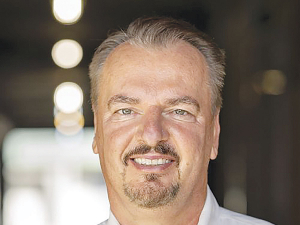Dairy power
OPINION: The good times felt across the dairy sector weren't lost at last week's Beef + Lamb NZ annual meeting.
 Frank Mitloehner’s key message to the Government is that it needs to work with farmers and not against them.
Frank Mitloehner’s key message to the Government is that it needs to work with farmers and not against them.
Greenhouse gas science communicator Dr Frank Mitloehner says the New Zealand Government must work with farmers to achieve climate goals, not against them.
Mitloehner is a professor at the Department of Animal Science at the University California, Davis. He specialises in measurements and mitigation of greenhouse gases and was recently in New Zealand on a trip funded by Beef+Lamb New Zealand.
B+LNZ has been calling on the Government to review New Zealand’s methane targets based on adopting a warming approach. It wants it to start to report on the warming impact of different gases, as well as total volume of emissions ahead of its review of methane targets in 2024.
During his time in New Zealand, Mitloehner met with farmers, scientists working to reduce agricultural emissions, Government officials and MPs. He also gave public lectures at Lincoln and Victoria universities.
B+LNZ chief executive Sam McIvor says Mitloehner’s visit proved invaluable in building understanding of the different impact gases are having on climate change.
“One of the objectives of the visit was to continue to build understanding of the science of methane as a short-lived gas and to encourage a focus on warming when setting methane targets,” he says.
In his lectures and meetings with government officials and MPs, Mitloehner explained that methane only needs to be reduced and does not need to go to zero. He said targets for agricultural sectors across the world should aim to be climate neutrality, not carbon zero.
He explained that because methane is a short-lived gas, it does not add additional warming if it is reducing. Mitloehner says if methane is reduced sharply enough, it can reverse previous warming. However, carbon dioxide has to get to zero to not add additional warming and to be negative to reverse previous warming.
Mitloehner’s lectures also covered his work with Californian farmers to reduce their agricultural emissions and how agriculture can be part of a climate solution. California has a target of a 40% reduction in methane emissions from manure by 2030 and an objective to start to reduce enteric methane emissions once viable technologies are available.
Methane emissions from manure makes up nearly half of livestock methane emissions in California, while enteric methane emissions represent the rest. Manure emissions are created by California’s feedlot systems that collect the manure in effluent ponds.
n New Zealand nearly all of the methane emissions from agricultural production are enteric, created by belching. In California, enteric methane is not counted towards emissions reduction targets.
McIvor concedes that while the technologies currently being used in California are not suited to New Zealand, the principle of what Mitloehner says is very relevant.
“A price should not be the primary mechanism to reduce emissions,” he says. “California has successfully reduced its methane emissions through using incentives to farmers to use new methane reducing technologies, rather than putting a price on emissions.
“Dr Mitloehner’s strong message to the Government was that it needs to work with farmers and not against them, and that a carrot approach was much more effective than the stick.”
McIvor says the Government has been intent on putting a price on agricultural emissions after initially wanting to put agriculture into the Emission Trading Scheme (ETS), which would have been incredibly damaging.
“Working with other agricultural organisations we have been successful in keeping agriculture out of the ETS, but the quid pro quo was that agriculture had to come up with an alternative pricing framework.”
The South Island Dairy Event has announced Jessica Findlay as the recipient of the BrightSIDE Scholarship Programme, recognising her commitment to furthering her education and future career in the New Zealand dairy industry.
New Zealand and Chile have signed a new arrangement designed to boost agricultural cooperation and drive sector success.
New DairyNZ research will help farmers mitigate the impacts of heat stress on herds in high-risk regions of the country.
Budou are being picked now in Bridge Pā, the most intense and exciting time of the year for the Greencollar team – and the harvest of the finest eating grapes is weeks earlier than expected.
The Real Estate Institute of New Zealand (REINZ) has released its latest rural property report, providing a detailed view of New Zealand’s rural real estate market for the 12 months ending December 2025.
Rural retailer Farmlands has released it's latest round of half-year results, labeling it as evidence that its five-year strategy is delivering on financial performance and better value for members.

OPINION: A mate of yours truly reckons rural Manawatu families are the latest to suffer under what he calls the…
OPINION: If old Winston Peters thinks building trade relations with new nations, such as India, isn't a necessary investment in…